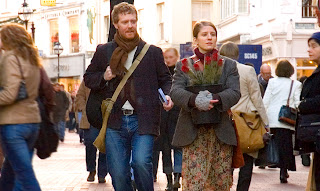A small film in the greatest sense of the word, Once is a musical of a different kind. Appropriately, since the film’s songs are its core, Once is musical in its structure; it finds visual equivalents to riffs, counterpoints and chord changes in its story and characters. The third feature by Irish film and television director John Carney, Once is an intimate and moving portrait of music and musicians. The director and his two lead actors, Glen Hansard and Marketa Irglova, are quite familiar with this milieu, all being musicians themselves. Hansard is the singer and chief songwriter for the Irish band the Frames, and Carney was the group’s original bass player. Irglova is a singer and musician who has collaborated with Hansard. The fact that they are both nonprofessionals lends Once its special charm. The easy and natural rapport they bring to their roles is a beautiful thing to behold.
The plot, such as it is, is simplicity itself. The Guy (Hansard), a busker performing on the streets of Dublin, has moved back in with his father after the death of his mother and the dissolution of his previous relationship. The pain he feels from this loss is still quite palpable, and he uses this as fodder for the sad, lovelorn songs he performs on the streets at night and in his room. He works during the day at his father’s vacuum repair shop, and performs on the street during his breaks. One day while performing, he meets the Girl (Irglova), a young Czech immigrant who lives with her mother and siblings in a small apartment and works as a house cleaner. Their initial scenes are fascinating to watch. The Guy, still quite a wary, raw wound, is initially dismissive, but soon warms to the Girl, giving her his CDs and inviting her for coffee. When she finds out he works for a vacuum repair shop, she asks him to repair hers. One day they visit a piano shop, where there is a piano that the Girl longs for but cannot afford. They sit at the piano to perform a song the Guy has just written. This is where the musical aspect of the film comes in. Instead of the normal movie musical grammar, where characters break out into fully orchestrated song as the story demands it, the songs in Once begin quite naturally, and it is as if the songs are being created before our eyes. The song they perform in the piano shop is “Falling Slowly,” and the lyrics of this song, as in the others to come, speak for the two characters:
I don’t know you
But I want you
All the more for that
Words fall through me
And always fool me
And I can’t react
And games that never amount
To more than they’re meant
Will play themselves out
Take this sinking boat and point it home
We’ve still got time
Raise your hopeful voice, you have a choice
You’ve made it now
Falling slowly, eyes that know me
And I can’t go back
Moods that take me and erase me
And I’m painted black
You have suffered enough
And warred with yourself
It’s time that you won
The Guy and the Girl quite literally make beautiful music together, forming a group with other musicians and eventually recording a demo. I saw Hansard and Irglova perform at the Tribeca Film Festival, and can attest to the fact that these songs sound even better when performed live.
In the film, the Guy and The Girl become more intertwined. Refreshingly, however, much as this is not a typical movie musical, the Guy and the Girl do not have a typical movie romance. Layers to their life stories are slowly revealed, and it doesn’t end in the way one would expect. The final image, involving the store piano, ends the film on a literally joyful note. Carney and his musician collaborators have created an exquisite paean to the joy of music and artistic creation.





